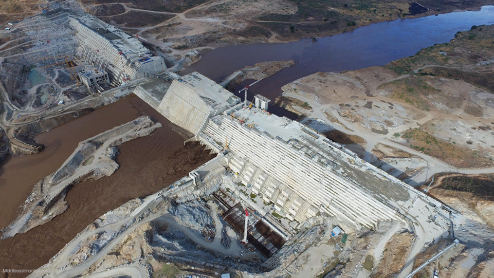Egypt expressed the concerns of its citizens regarding the Grand Ethiopia Renaissance Dam (GERD) that is expected to affect Ethiopia’s annual share of Nile Water, Irrigation Minister Hossam Moghazi said on Monday. Moghazi said in a press conference on the sidelines of his inspection visit to a group of water projects in Sharqiya governorate that Egypt is exerting effort in order to eliminate such worries on an objective and scientific basis and through ‘meaningful dialogue’ with other Nile basin countries. Moghazi said the Saturday’s ninth dam meeting, to be convened in Cairo, would be held to resolve the conflicts between the foreign consultancy firms conducting studies related to the Ethiopian dam.(Hebdo Ahram)
He said that several pivotal alternatives would be raised in order to resolve the conflict. Only experts from Egypt, Ethiopia and Sudan will attend Saturday’s meeting in Cairo. (Hebdo Ahram)
Egypt’s primary concern in the construction of the Ethiopia Renaissance Dam is when it is being built it does not cut of the water supply that the Nile floods have allowed it to enjoy. Sudan too is concerned about the flow of water through the Nile. Although this is to a lesser extent than Egypt. Egypt for its part fears there is a risk that the famous life giving river that nourishes its fields will dry up. Addis Ababa need the dam to power electricity both for domestic use and for export. The GERD could transform Ethiopia into a power house for the horn of Africa region. However, Cairo fears the GERD could eventually be used to store water on its own.
A trilateral summit between the parties may iron out its differences but will be a long road ahead to rebuild trust. The experts meeting on Saturday last week will have a lot of weight on their shoulders.
According to Moghazi, a report will then be delivered to the three countries’ irrigation ministers. A meeting will take place between the three countries’ irrigation ministers, as well as possibly the foreign ministers, in order to reach an agreement. Moghazi also affirmed that Egypt’s share of Nile water is non-negotiable, adding that it will work on increasing the country’s share of Nile water. According to Moghazi, there has been a noticeable development in the relationship between Egypt and the Nile Basin countries. He added that Egypt is “rectifying the mistakes of the past,” making the relationship with the Nile Basin countries a priority for foreign policy. In September, Dutch Consultancy firm Deltares withdrew from the assessment of the dam.(Hebdo Ahram)
Egypt is the most populous county in the Arab world. Its population is going to continue to grow and the regime of President Abdel Fattah el Sisi needs to keep the Egyptian populace fed. The Egyptians for their part have to find a way to expand the reach of their farmland to feed the larger portion. A major problem with the Egyptian people is the lack of support the regime in Cairo gives to those who don’t serve the government. In Egypt the same farming methods have been in use since ancient times. There is need for serious updates in terms of machinery. Sudan for its part is on the brink of an all out civil war that could impact the stability of both Egypt and Ethiopia.
Technical experts from Egypt, Sudan and Ethiopia have met in Sudan on Thursday to discuss technical issues related to studies on the impact of the GERD on Downstream countries, an Egyptian Foreign Ministry Spokesman told Al-Ahram Arabic news website. The 15th round of the meetings in the north-eastern Sudanese city of Atbara will discuss a preliminary report about the technical methodology of the planned studies by French firms BRL and Artelia, spokesman Ahmed Abu Zeid told Al-Ahram Arabic website. BRL said last year that the studies were scheduled to start in late 2016 and should take eleven months. The latest meeting was held in Addis Ababa and in May and concluded with resolving points of contention over the dam studies, which will assess the hydrological, environmental and economic impact of the megaproject on downstream nations, Egypt and Sudan.(Hebdo Ahram)
Egypt is relatively more stable than Sudan in these talks. The main concern for both countries is the continued flow of the Nile’s flood waters downstream. Ethiopia it should be noted is building the GERD for hydropower, not irrigation. Sudan for its part supports Ethiopia’s construction of the dam believing it could benefit from the hydropower export. This may be one of the reasons why it agreed to have one of its cities play host. Egypt for its part has come to clashes with Ethiopia over the building of the dam. Most of this is possibly to do with the fear that the country will lose its water. The bulk of Egypt’s populace already live on a narrow strip of land near the Nile River. This is why the country is looking to expand its housing project into the desert somehow.
Its all a matter of reaching the right conclusion and agreement with these meetings.
Article written by:
Yacoob Cassim
Journalist at Radio Al Ansaar






